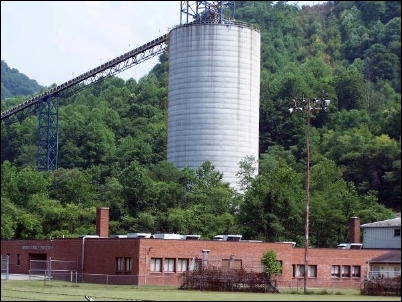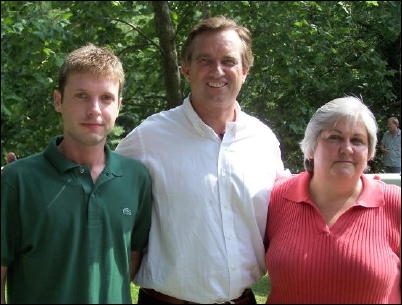SECOND COAL SILO WILL BE BUILT BESIDE RALEIGH SCHOOL - "We Just Plain Don't Count"

Massey's giant coal silo looms over Marsh Fork
Elementary School, with a 2.8 billion gallon
sludge pond lurking on the mountain above, with a second silo to be built
(Hur Herald Photo)
By Bob Weaver
Environmental lawyer Robert F. Kennedy Jr. flew over the West Virginia coalfields in July, 2007 to get a better view of mountaintop mining.
He said it is "a sight that would sicken most Americans."
After visiting Marsh Fork Elementary School, he said it is an example of crimes against nature and crimes against children.
He railed against corporate media for failing to report the traumatic issues directly affecting the lives of West Virginians.
Standing ominously over the Raleigh elementary school is a Massey Coal silo and up the hill is a looming a 2.8 billion gallon sludge impoundment that shows leakage.
Now, the WV Supreme Court has ruled that Massey can built a second silo next to the school.
The debate started in 2005 when Massey applied for a permit to build a second silo near Marsh Fork Elementary.
Since then, it's been a battle between the coal company and concerned citizens, with most of Marsh Fork school's administration and parents adamantly claiming the coal operations have little or no affect on children, most of them having family members working for Massey.
Challenge WV Executive Director Thomas Ramey said "There appears to be greedy threads of corruption linked to this battle and school consolidation in West Virginia," citing deals with coal corporations, including land acquisition and ignoring environmental considerations in the Mingo County school consolidation battle.
"It's difficult to believe there is an argument over the location of these silos next to a school, not alone the multi-billion gallon sludge pond above the facility," Ramey said.
Coal River Mountain Watch claims the permit puts the silo around 170 feet from the school. They say the law prohibits any coal activity within 300 feet of the school.
The WV Supreme Court disagrees, saying their decision was solely based on a legal interpretation related to location, not public health issues.
Louise Maynor, former Marsh Fork Elementary principal says another silo is not a bad idea. "A silo is better than dumping all the coal on the ground," she said.
Maynor says during her time as principal, the close proximity of the mining activity was not a problem. "Basically, the school was not any dirtier than any other school I've taught in," she said.
According to research conducted in 2006 by engineering company Ashby-Tucker, the dust produced from the mining activity was found in the school.
The study concluded that the students were at risk of inhaling dangerous pollutants that could cause health problems.
Later, WV environmental officials did a study of the school that said the students were not at risk.
Former coal miner turned activist, Ed Wiley says he believes adding a second coal silo will allow Massey to process even more coal at the facility, increasing both the dust and the chemicals near the school.
"There's many, many threats that comes off the silo," he said.
"You have the coal once it is clean comes up the belt line and goes into this silo to store to load the trains," with workers constantly cleaning the fine dust underneath the belt line, Wiley said.
"We just plain don't count," he said, proclaiming children deserve a new school.
Former principal Maynor agrees it would be good to build a new school, blaming disruption cause by people from out-of-state touring the property.
"The children, of course, they hear talk at home of all the things going on in the community and then when they see these strange people outside at the school they tend to get upset because they're wondering why they're there," Maynor saying it's not quite fair to the children.
"Of course, we all know that Don Blankenship's political action effort has be been "for the sake of the children," commented Ramey.
Despite the acclaimed "billion dollar coalfield," southern West Virginia remains one of America's most impoverished regions, a lack of basic infrastructure, some of the worst school buildings and poorest test scores, with a few thousand coal jobs left, with employment diminished by mountaintop removal.

Challenge WV fellows, Thomas Ramey and Lorelei
Scarbro with Robert Kennedy, Jr. (center)
advocating for the protection of community schools
(Hur Herald Photo)
Challenge WV fellows Lorelei Scarbro, who lives in the community, and Thomas Ramey, met Kennedy while visiting the Massey Coal operation and Marsh Fork Elementary School in 2007.
Scarbro said "Realizing corporations don't have a conscience, how can any person who has one, support what is happening at Marsh Fork."
Kennedy was encountered by several Marsh Fork woman, supporters of the school and wives of Massey coal miners. They told Kennedy there is no problem with the giant silo, emitting dust and waste, nor are they concerned about the sludge impoundment.
They repeated, "It's about jobs and feeding our family," indicating the problem is worsened by outsiders.
Kennedy spent time on the creek bank near the school, a stream which tenuously sustains life.
He told a nearby gathering that Massey Coal has received tens of thousands of citations and billions in fines - crimes against nature and the people of West Virginia.
He said that blowing up mountains and burying streams is taking precious resources that rightly belong to the public and to future generations, including the education and health of children.
Julia Bonds, award-winning environmentalist and leader of Coal River Mountain Watch, said the coal industry has ignored the impact of the cultural, educational, social, spiritual, and health problems of WV communities.
Bonds is the sister, daughter, granddaughter and great-granddaughter of coal miners.
"How can putting children on long bus rides across tortuous mountains be about good education?," Ramey asked.
"When the dust settles, it will be mostly about the money," he concluded.